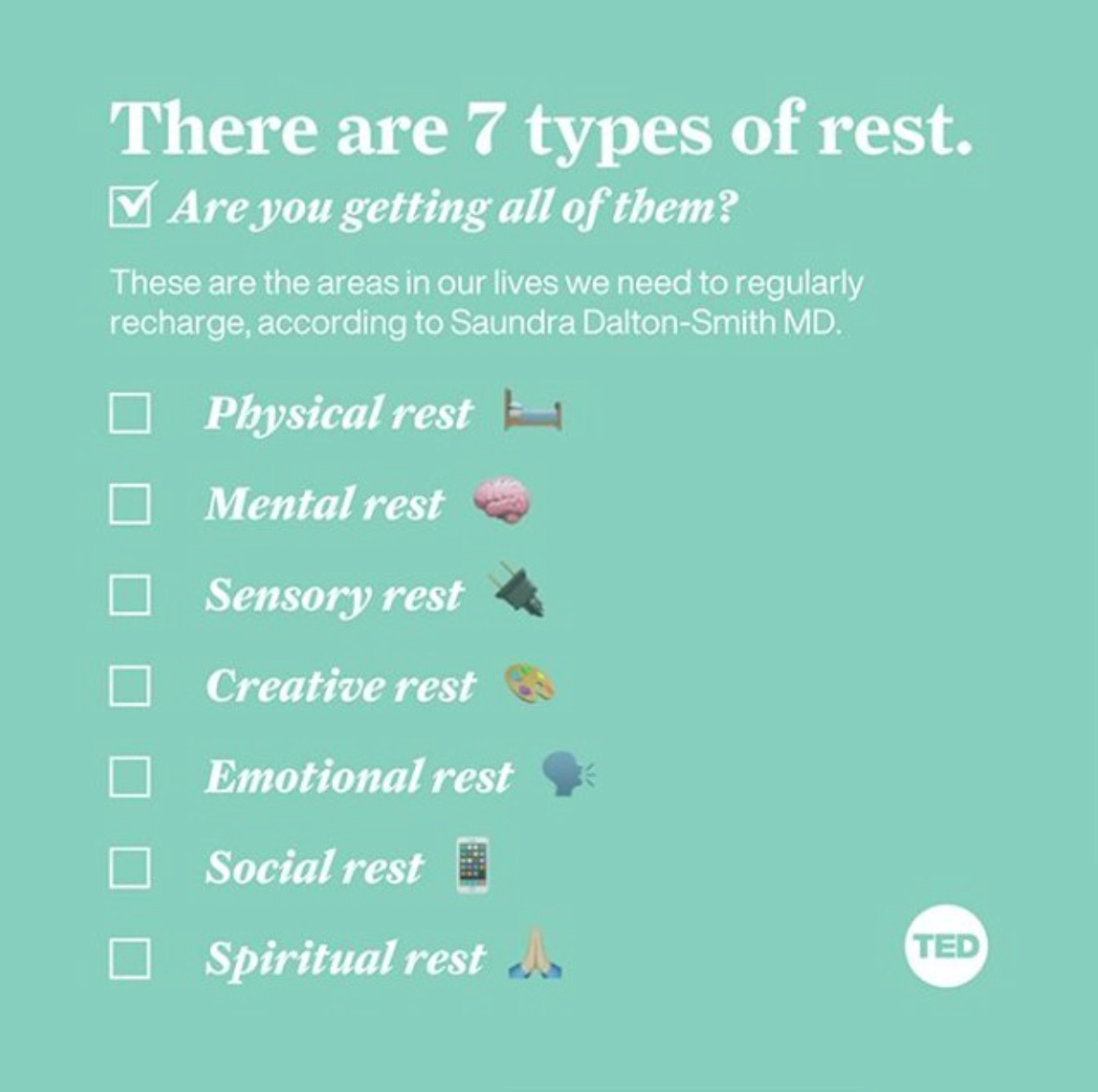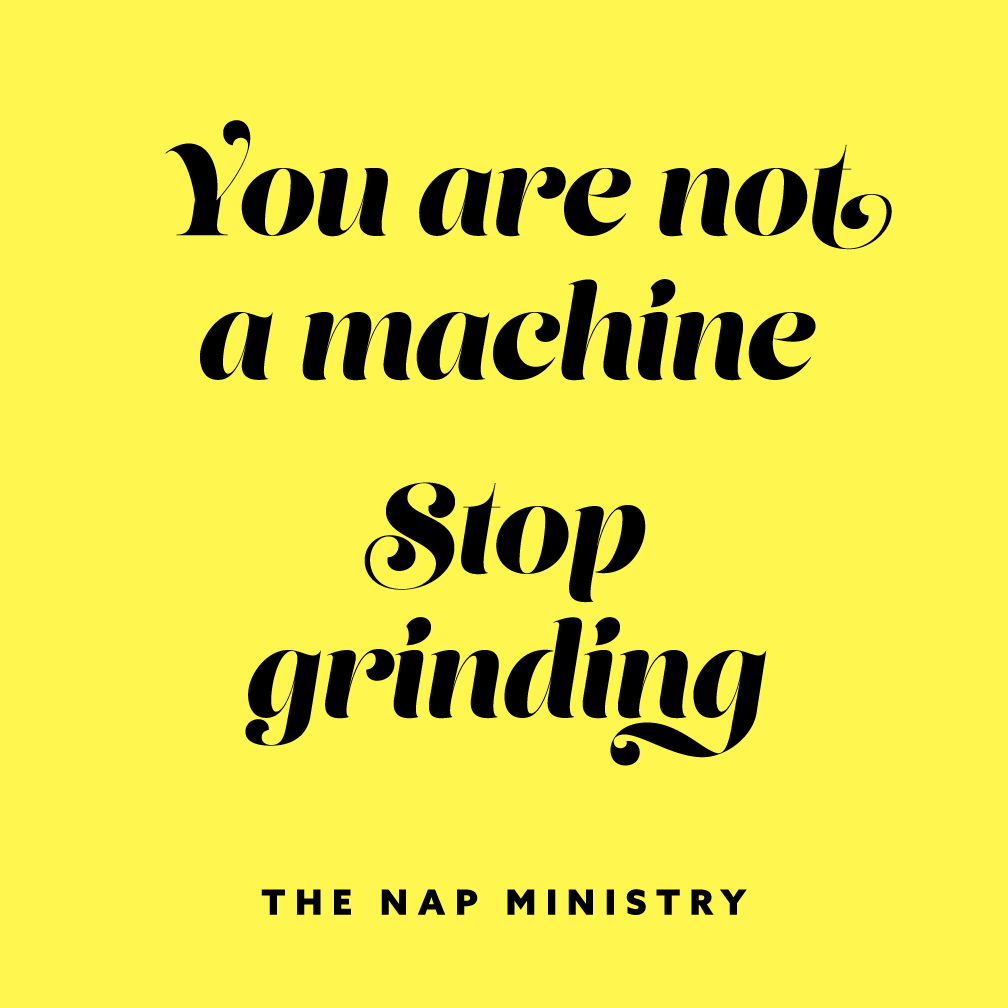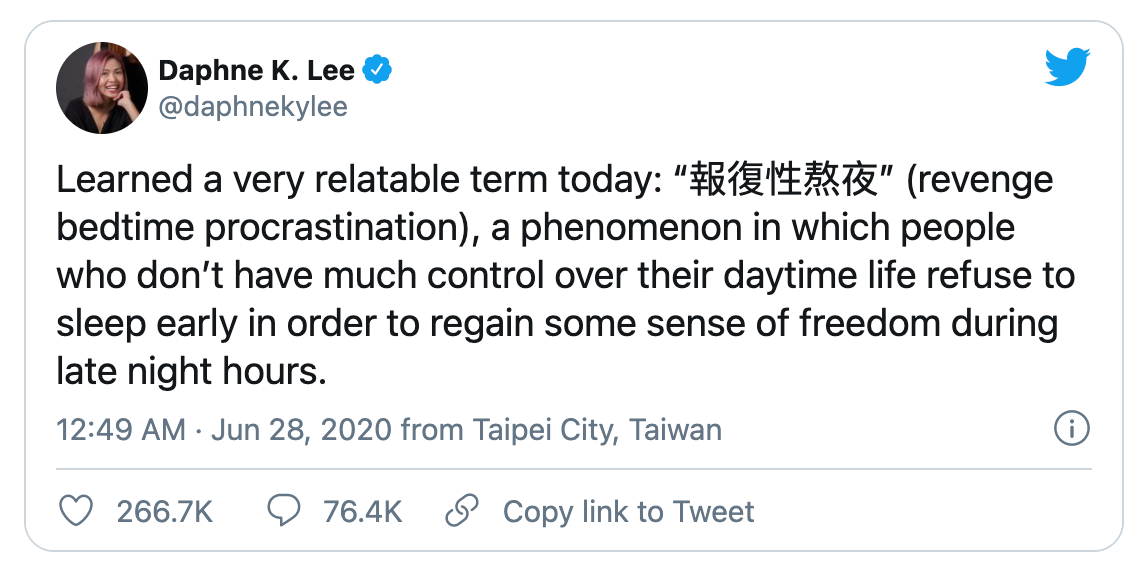Chronically Cheerful #3: Get some rest.
Why we procrastinate at bedtime, seven types of rest, and rest as resistance.
Everyone I talk to these days is tired of being tired. It’s the one-year anniversary of the pandemic. Loneliness and safety precautions continue to drain our energy. Meanwhile, we are still somehow managing daily life and powering through personal struggles.
How are we supposed to feel rested while dealing with all of this? *gestures around vaguely*
Today’s newsletter is all about that ever elusive idea of actually feeling refreshed, recharged and restored — and what barriers might be blocking us on a practical and societal level. In the meantime, here’s to being tired, together!
Q&A: Question from the CC Community
Q: How do you balance needing to rest and needing to go for a walk for your mental health? - @mindfullyevie
A: There’s no question that how much or little we move and rest has a direct impact on our mood and minds. The core of this question is: When is our mental health better served with movement, and when is it better served with stillness?
It’s a tricky balance. Moving our bodies — even when we’re fatigued or in pain — can release amazing positive chemicals like endorphins, making us feel more more energized or giving us some pain relief.
Yet respecting your body’s cues is critical, especially when dealing with chronic illness or a mental health condition like anxiety. Gently pushing yourself when your brain offers some automatic resistance can be productive. Pushing yourself past your pain threshold can have lasting negative consequences.
One of my friends Zoe is a physiotherapist specializing in chronic illness. She always says, “Do what you can, when you can.” After 3+ years living with chronic illness and anxiety, this is what I know: During times when my anxiety is higher than fatigue or pain, I choose gentle movement (a walk, stretching, yoga) to help my headspace and relax my body. When my pain or fatigue is far higher than my anxiety, I will choose to rest (lying down to listen to an audiobook or podcast, napping).
Most days, it’s not an even split. For many of us, our mental and physical health can ebb and flow hourly, if not daily. This is when I turn to movement “snacks” (mere minutes of light movement) for whenever pain or fatigue can accommodate.
Most of all? Respect the need for absolute rest when the idea of moving makes you want to crumble on the spot — either mentally or physically.
Rethink This
When we’re tired, most of us assume it’s a sign to nap or to adjust our bedtime. But what if physical rest isn’t the whole answer?
Physician and author Dr. Saundra Dalton-Smith proposes that there are 7 types of rest we all need to feel awake, attentive, creative and emotionally available. She says:
We go through life thinking we’ve rested because we have gotten enough sleep — but in reality we are missing out on the other types of rest we desperately need.
Dr. Dalton-Smith says we need to take care of all of following to feel truly restored:
Here are her definitions for all of the categories:
Physical rest: practicing both passive physical rest (like sleep) and active physical rest (like stretching and yoga) in your routine.
Mental rest: finding ways to take short breaks during the day, slow down and unwind from your worries.
Sensory rest: intentionally unplugging and working to be present.
Creative rest: finding ways to reawaken our inner awe and wonder by connecting with nature and the arts.
Emotional rest: having the time and space to freely express your feelings and cut back on people pleasing.
Social rest: surrounding yourself with positive and supportive people and distancing yourself from those relationships that exhaust us.
Spiritual rest: the ability to connect beyond the physical and mental and feel a deep sense of belonging, love, acceptance and purpose — such as through prayer or community involvement.
I love how this framework could help us assess what area of our life is in need of some attention when our batteries are running low. What types of rest do want to work on?
Consider This
Next time you’re doubting whether you actually have time to slow down, try reframing the nature of rest itself.
Our society profits off of hustle culture, perpetuating the insidious notion that if we any take kind of time off, we’re lazy, weak or falling behind. The Nap Ministry is doing important work in this area, examining the liberating power of rest.
The Nap Ministry names sleep deprivation as a racial and social-justice issue, showing how the concept of “productivity as worth” is actually a concept rooted in slavery and colonialism.
In an interview with the Atlantic, founder Tricia Hersey said:
White supremacy and capitalism have stolen not only our rest, but also our intuition. To think that in this day and age, there’s no time for you to at least take 10 minutes to reclaim rest and daydream or debrief for a little bit longer before you go to shower, is not true…Part of rest resistance is also reclaiming your imagination and reclaiming hope, reclaiming your intuition of knowing there’s always time for you to reclaim your body as yours.
I want to reimagine rest to be a slowing down, a mindfulness, a paying attention. I believe taking moments of silence is a form of rest. Taking long baths. A longer shower. Prayer, meditation, daydreaming. Doing a sun salutation in the morning. Sitting on your couch for a few minutes before you rush out to do 300 more things, giving yourself 10 minutes of intentional time listening to your body. And the time to rest is now, because it’s not a privilege; it is our right. It’s a human right.
What a beautiful idea that rest is simply our right and not a reward for finishing your to-do list or clocking in at the end of the day. As a challenge, try to embody some of this ethos next time you catch yourself thinking, “I don’t have time for a break.”
You’re Not Alone in This
Generally, I don’t have great boundaries with my phone. Especially around bedtime, I just can’t seem to stop scrolling. Sound familiar?
This phenomenon actually has a name: Revenge Bedtime Procrastination.
Apparently, this behavior stems from something pretty simple: the need for control. During the daytime, we’re all facing bigger burdens and a heightened lack of uncertainty. Through this small nightly act of digital rebellion, we feel like we’re gaining a sense of superficial empowerment. The irony is that as we scroll later and longer, we feel worse and less equipped to handle whatever the day throws at us.
Experts recommend reassessing how you spend your waking hours so you feel more empowered before bedtime hits. What tiny tweaks can squeeze in during the day to create restorative moments? The key here is to give yourself permission to do something that’s not mandatory and not on behalf of anyone else. Easier said than done, I know — so start super small. Try anything from adding in a few minutes to read a book during lunch to taking a twenty minute nap in the afternoon.










Loved all the tips, especially the one about reassessing how your day went so you don’t stay up late scrolling. Thats so me! Thanks Carolyn.😀